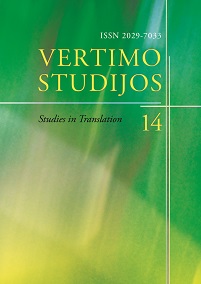Lietuvos vertimo rinkos dalyvių požiūris į mašininį vertimą ir postredagavimą
The Attitude of the Lithuanian Translation Market Participants towards Machine Translation and Post-editing
Author(s): Karolina LevanaitėSubject(s): Baltic Languages, Philology, Translation Studies, Stylistics
Published by: Vilniaus Universiteto Leidykla
Keywords: machine translation; neural machine translation; post-editing post-editor; post-editing competences; training of post-editors;
Summary/Abstract: The article presents the results of the research project funded by the Research Council of Lithuania, the aim of which was to find out the attitude of Lithuanian translation market participants – companies and freelance translators – towards machine translation and post-editing. Currently, there is no objective information on the application of machine translation in companies providing translation services in Lithuania or the attitude of translators to machine translated texts and the challenges posed by post-editing as a service. There is also no information on the competences that need to be developed by translators and translation students so that they can adapt to this new reality and work successfully on the market. To reach this aim, two questionnaires were prepared: one for translation companies providing translation services (n1=42) and the other for translators (n2=61), and two surveys were carried out. A qualitative analysis of survey data confirmed that among market participants there is a strong belief that as machine translation programs progress, the importance of competences ensuring quality post-editing will grow rapidly. Among the most important competences for post-editing, both groups of respondents singled out knowledge of text linguistics, native and foreign language proficiency, and knowledge of the field of translation. However, the surveys have also revealed that at least one third of market participants have a negative view toward machine translation and see it as a threat to the quality of translation (agencies) and/or their jobs (translators). It is expected that the conducted research will contribute to the promotion of a more favourable attitude of translators to machine translation technologies and will encourage further research in post-editing in Lithuania.
Journal: Vertimo studijos
- Issue Year: 14/2021
- Issue No: 14
- Page Range: 22-39
- Page Count: 18
- Language: Lithuanian

